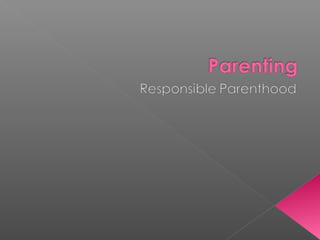Parenting ppt
•Transferir como PPT, PDF•
66 gostaram•83,876 visualizações
Denunciar
Compartilhar
Denunciar
Compartilhar

Recomendados
Recomendados
Mais conteúdo relacionado
Mais procurados
Mais procurados (20)
POSITIVE PARENTING : PERSPECTIVES AND PRINCIPLES OF PARENTING WITH INDIAN EMP...

POSITIVE PARENTING : PERSPECTIVES AND PRINCIPLES OF PARENTING WITH INDIAN EMP...
Parenting styles and their possible impact on children

Parenting styles and their possible impact on children
Destaque
Destaque (11)
Family presentation phpapp01.pptx [восстановлен] - copy.pptx [восстановлен]![Family presentation phpapp01.pptx [восстановлен] - copy.pptx [восстановлен]](data:image/gif;base64,R0lGODlhAQABAIAAAAAAAP///yH5BAEAAAAALAAAAAABAAEAAAIBRAA7)
![Family presentation phpapp01.pptx [восстановлен] - copy.pptx [восстановлен]](data:image/gif;base64,R0lGODlhAQABAIAAAAAAAP///yH5BAEAAAAALAAAAAABAAEAAAIBRAA7)
Family presentation phpapp01.pptx [восстановлен] - copy.pptx [восстановлен]
Family structures & Classification (for a Sociology Presentation)

Family structures & Classification (for a Sociology Presentation)
Semelhante a Parenting ppt
Semelhante a Parenting ppt (20)
Parenting styles and psycho social development of children

Parenting styles and psycho social development of children
What The Science Says About The Most Popular Parenting Styles.pptx

What The Science Says About The Most Popular Parenting Styles.pptx
Impact of Parenting Styles on Children- Amberlay Preschool

Impact of Parenting Styles on Children- Amberlay Preschool
Amberlay Preschool - Impact of Parenting Styles on Children

Amberlay Preschool - Impact of Parenting Styles on Children
Parenting ppt
- 2. Parenting is the process of raising and educating a child from birth until adulthood. This is usually done in a child’s family by the mother and the father ( the biological parents ) MOTHER= IS THE NATURAL OR SOCIAL FEMALE PARENT OF AN OFFSPRING. FATHER= IS TRADITIONALLY THE MALE PARENT OF A CHILD.
- 3. 1. Authoritative parenting * Democratic or balance parenting. Ii has a give and take nature. * It encourage children to be independent but still places limits and controls on their actions. * Authoritative parents sets limits and demand maturity but when punishing a child, the parent will explain his or her motive for their punishment.
- 4. Parent are attentive to their children's needs and concerns and will typically forgive and teach instead of punishing if a child falls short. Result in children having a higher self esteem. This is the most recommended style of parenting by child rearing experts.
- 5. Also called strict parenting. Characterized by high expectations of conformity and compliance to parental rules and directions. It is a restrictive punitive style in which parents advise the child to follow their directions and to respect their work and effort.
- 6. Authoritarian parents expect much of their child but generally do not explain the reason for the rules and boundaries. Authoritarian parents are less responsive to their children’s needs and are more likely to spank a child rather than discuss the problem.
- 7. Permissive parents want to and tend to give up most control of the home and family life to their children. Parents make very few rules and even when they do decide to make a rule, the rules that they make are usually not enforced all the time or properly. Parents want children to feel as if they can be free to do or say as they wish.
- 8. This is also called uninvolved, detached, dismissive or hands- off parenting style. The parents are low in warmth and control and are generally not involved in the child’s life. Parents are emotionally unsupportive of their children but will still provide their basic needs.
- 9. Refers to the ability of the couple or parents to respond to the needs and aspiration of the family and children.
- 10. The size of the family should be a shared responsibility of couples or parents based on their available resources and the standard of living they wish to achieve. By waiting to get married and have children, young people can give themselves more time to pursue the things that can help to make them better partners and parents- education, employment, personal maturity, self confidence etc